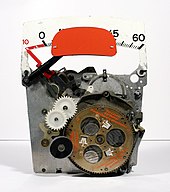parking meter

A parking meter (more rarely Parkometer called) is a bar with a mechanical or digital clock that displays the remaining allowed parking time. It is set up on the edge of a parking lot. By inserting coins ( parking groschen ) or, more recently, by sending an SMS , you pay the fee for a certain parking time, which is then counted down by the clock.
Parking meters were introduced in order to automatically enable fee-based parking - usually a maximum of two hours - or to limit long -term parking when parking spaces are limited . Parking meters were found en masse in most inner cities and main shopping streets until around the turn of the millennium. Today they are largely replaced by parking ticket machines. In contrast to the parking meter, they can sell a parking space several times, while the remaining parking time at the parking meter can be used by a successor.
history
The inventor of the parking meter is believed to be the American Carlton Cole Magee in North Dakota, who filed a patent on May 13, 1935 for a coin-controlled parking meter . The patent no. 2,118,318 was not granted until May 24, 1938. The first parking meter was set up on July 16, 1935 in Oklahoma City ( USA ) and was named "Black Mary". In Europe , the first parking meters were installed in Basel in 1952 .
On January 4, 1954, twenty so-called “parkographs” were installed in Duisburg, the first city in Germany, in the “Am Buchenbaum” street. The devices were manufactured by Roberto Ehrismann (today Roberit AG) from Lugano . In Germany , Telefonbau and Normalzeit in Frankfurt am Main , Kienzle Apparate GmbH in Villingen and Deutsche Parkometer GmbH in Hanover began producing parking meters in 1952 .
In 1954 there was still no legal regulation in the Federal Republic of Germany to force motorists to pay parking fees. It was controversial whether parking meters were compatible with German traffic law. On May 1, 1956, the road traffic regulations were changed and parking meters were thus legally legitimized.
In 1954 it was possible to park for an hour in Duisburg for a penny . In 2014, parking space management generated 2.5 million euros.
From the 1990s, more and more parking meters in Germany were replaced by parking management zones with parking ticket machines.
See also
Web links
- Philine Gebhardt: 75 years of parking meter - your time is up . Article on one day, Spiegel Online , July 16, 2010.
- Parkographers . The mirror . 10/1954 (March 3, 1954), inset on p. 10 at the end of the article Die Ehre Preußens (only in PDF text, not in OCR text).
Individual evidence


